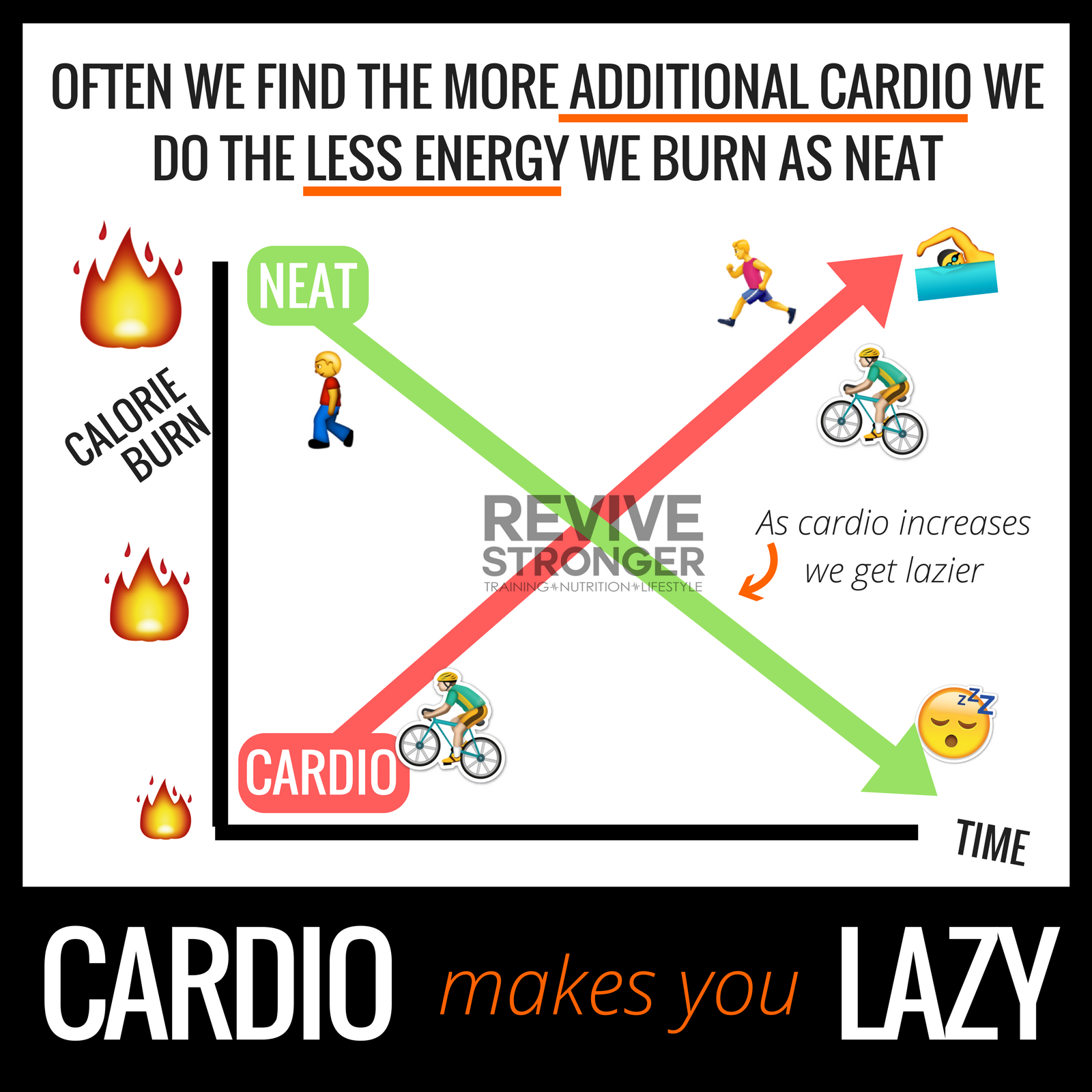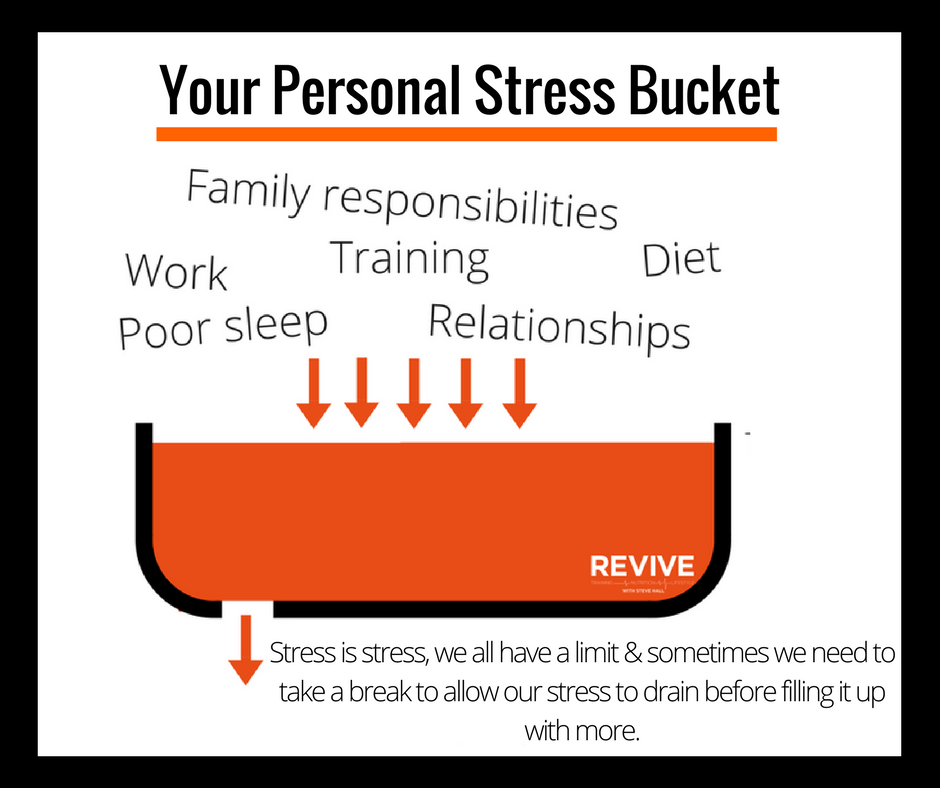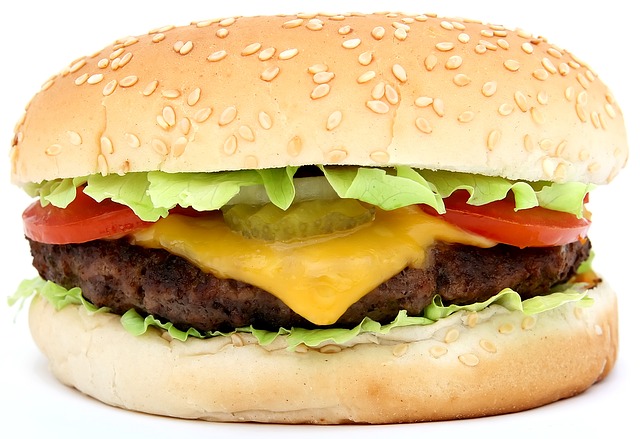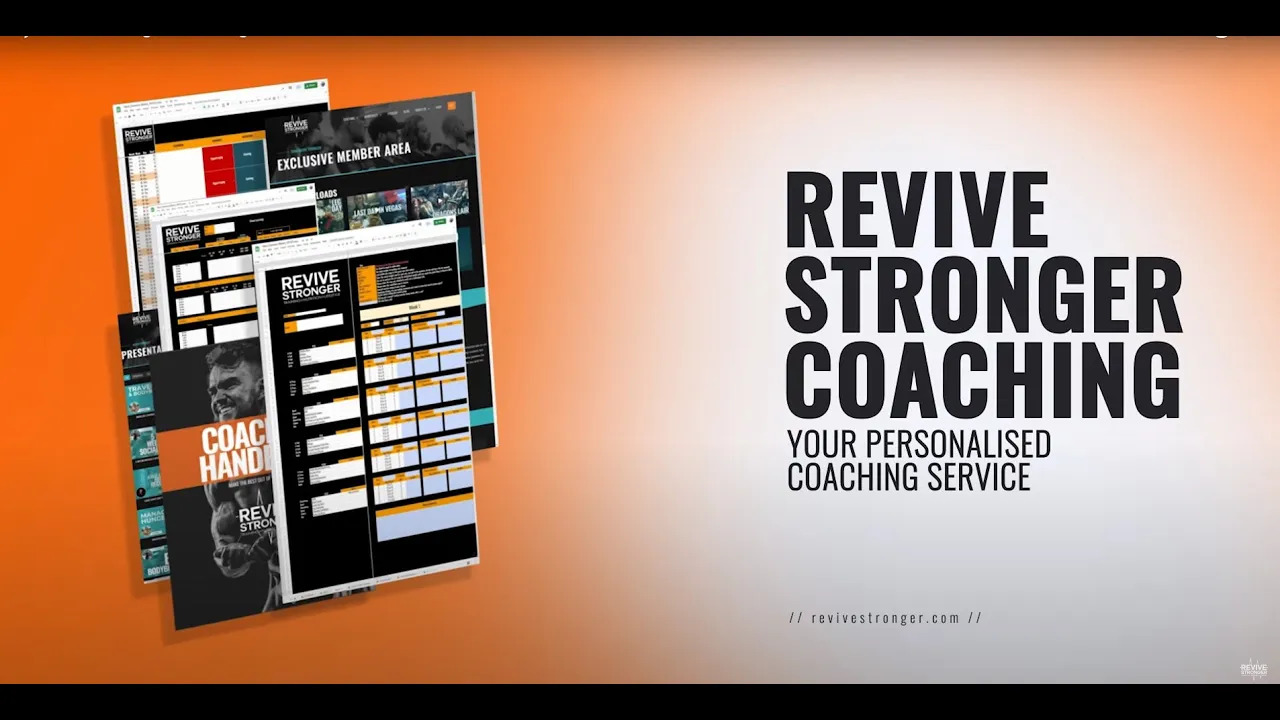
Revive Stronger
5 Reasons Cardio Is OVERRATED
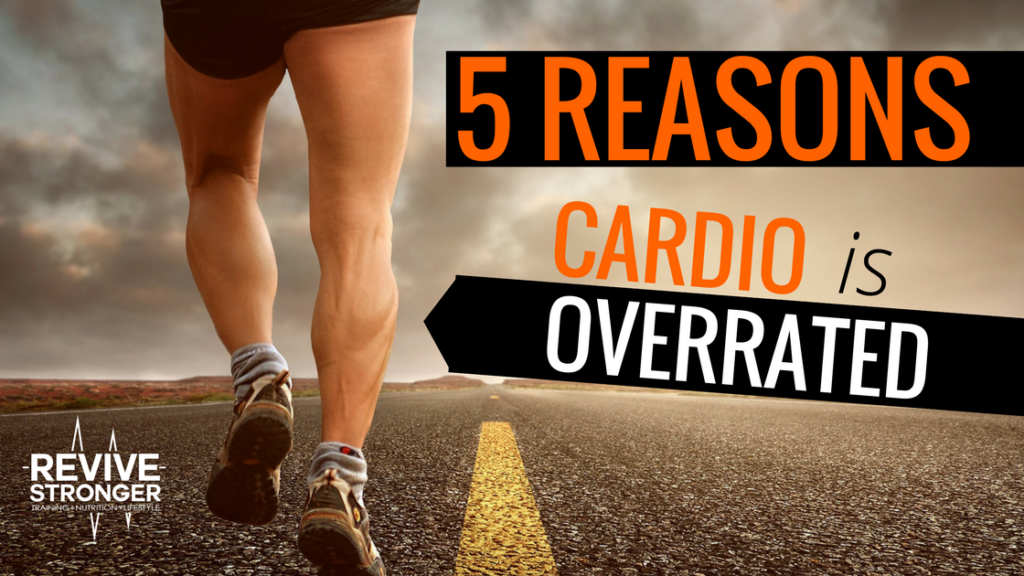
When people think of fat loss, then automatically think cardio.
Crank up the cardio right?
Not so fast my friend.
Cardio may not be this magic little fat burning machine that you think it is, and this article is going to go over exactly that.
Ryan Solomon (our wonderful admin in our free facebook group) is going to cover the following:
- The influence cardio has on NEAT
- The interference effect between cardio and training
- How cardio can be disproportionately mentally fatiguing
- How you become more efficient at doing cardio, resulting in fewer calories burned
- How cardio makes some people ravenously hungry
So sit back, and enjoy this article-long hate session on cardio!
Table of Contents
Reason #1: Cardio Can Lower NEAT Levels
What are NEAT levels?
NEAT is an acronym for non-exercise activity thermogenesis [1]. That’s just fancy talk for the movements we make while going through our daily lives. Examples would include fidgeting, bouncing your foot, or shifting your weight back and forth frequently when standing.
Being the son of a bitch that your body is, and that it enjoys homeostasis, it makes sense that there’s research [2] supporting the fact that when some people increase their activity through cardio, they decrease their non-exercise activity. The net result is their total daily energy expenditure staying about the same, meaning, no fat burning for them.
[^^ Explanation: Cardio can cause you to reduce your caloric expenditure via NEAT levels, but it can also be used as a tool to combat lowered neat levels which may occur naturally when going through a fat-loss phase.]
Personally, I’ve seen this in my past experience. I would do cardio in the morning before school, and I would just feel wiped throughout the day. I noticed I would just slouch in my chair during class, and burn as little energy as possible. Rather than when I’m in a caloric surplus, I’ll be sitting with much better posture, and I’ll be bouncing both feet all class period… and actually talking to my friends rather than sitting there thinking about food…
How to combat lowered NEAT levels if you are doing cardio?
- Be mindful of your daily activity levels.
- Plan to do things like standing while working, or taking little 5 minute breaks from work to walk around.
- You could even use a tool like wearing a step tracker, and even if it’s not all that accurate, it should still be pretty consistent, and give you an idea of when your NEAT levels are up, and when they are down from the norm.
Reason #2: Cardio Can Interfere With Training
When trying to drop some bodyfat, resistance training is SUPER important.
It’s the primary stimulus for us to keep our muscle. It’s how we change our body composition for the better, rather than just becoming a smaller version of ourselves by losing weight. We don’t want to end up looking like skinny marathon runners… not saying they look bad, just saying that’s probably not what you’re after.
So, since we know how important our resistance training is to the desired outcome of dropping fat, it wouldn’t be very wise to do something that interferes with that training too much.
In a recent research review called MASS, done by Eric Helms, Mike Zourdos, and Greg Nuckols, they illustrated that the literature points toward a pretty significant interference effect between cardio and training. Basically, the more volume of cardio you do, the more frequently you do cardio, the more intense the cardio is, the more impactful mode (meaning running would be of higher impact than cycling), the more it negatively influences your training.
I think about it like this; you have a glass full (or even a bucket like below) of energy and recovery resources for ALL of your training. The more energy you spend doing the actual cardio itself, and recovering from it, the less energy and recovery resources you have in the glass to resistance train. The more frequent, intense, voluminous, and impactful the cardio, the more energy and recovery you’ll take from the glass.
I have found this to hold true in my personal experience.
I used to do HIIT cardio, high intensity sprint intervals on the treadmill, 2-4x/week while dieting to lose fat. On more recent diets I’ve used cardio much more sparingly, and in lower intensity/impactful version. What I’ve found personally is that I’ve been able to retain more strength (POTENTIALLY indicating I’ve maintained more muscle). Especially in my leg movements, without the highly intensive and impactful cardio, and I’ve noticed no difference in rates of fat loss. If anything, I’ve burned more fat with the less impactful, intensive cardio because I wasn’t as fatigued all of the time.
You probably already have a good idea based on the above, but how can you combat the interference effect if you are doing cardio?
- Keep the intensity pretty low.
- Space it as far from your lifting session as possible (i.e on off days).
- Keep the mode low-impact (i.e walking,cycling or swimming instead of sprinting or jumping rope).
Reason #3: Cardio Is Mentally Fatiguing
Time for 45 minutes of cardio, who’s excited?
I sure as hell am NOT.
It’s not that I physically think doing 45 minutes of low-moderate intensity cardio is THAT difficult, I just feel that it drains me mentally.
I feel this way because I simply don’t enjoy doing cardio (except for going on a walk or bike ride OUTSIDE), so getting myself to do it is a real buzz kill, especially when it’s for long periods of time. I don’t think I’m in the minority on this one either.
How to combat the mental fatigue of cardio?
1.] Do the form of cardio you enjoy most.
For me, this is going to be things like going on walks or bike rides outside. Also, try to make the cardio more enjoyable. You can do this by watching your favorite show, listening to podcasts, reading, playing a game, or anything else that takes your mind off doing the actual cardio.
2.] Keep it manageable.
If I know I’m supposed to do 3 hours of low-intensity cardio this week, I’m going to split this up in a nice and manageable way. For example, I would do 6×30 minute sessions spread out evenly throughout the week. I could simply go for a walk every morning, and have my cardio knocked out. Personally, this is a much more sustainable route than say doing 3×1 hour sessions, as this amount of cardio straight would be quite the drag for me, and would induce much more mental-fatigue.
3.] Add variety.
Doing the same exact session of cardio over and over again can get pretty boring.
So, switch it up.
If you are going to do 40 minutes of cardio today, then maybe you go on a 20 minute walk in the morning, and then do 10 minutes of biking and 10 minutes on the elliptical. This is a great way to break it up, and I’ve personally benefited greatly mentally from doing this.
Reason #4: More Cardio = Increased Efficiency
Okay, I must say, this one’s is pretty minor, but it’s still something that should be considered.
The more cardio you do, the more efficient you get at it, and the more fit you become.
The better you get at performing cardio, and the less energy it takes per unit of time to perform that cardio.
It’s like when you start out at a new job. At first, you aren’t very efficient at it, and you burn up a lot of energy trying to figure out the best way to get things done. After a while, you get better, and it takes less effort to perform the same amount of work. This is similar to what happens with cardio. The longer you do it, the better you become, requiring less energy to do the same amount of work you’ve done previously.
This means less total calories burned, and less of a caloric deficit for fat-loss. Although, it’s not THAT many fewer calories [3].
Say you burn 400 calories in a session of cardio. After 5 or 6 weeks, you come back and do the same exact session, you’d probably burn a bit fewer calories for that session, but my guess would be that it’s under a ~50 calorie difference.
So, how can you make sure to combat this increased efficiency and fitness?
Easy.
You just increase the workload of that cardio session.
You know, kinda like how we increase the amount of weight on the bar to make our training more stimulating.
So if you went on a 5 mile walk at a 3% incline at a speed of 3mph, after 5 weeks, you may need to ramp that up to a 5 mile walk at a 3.5% incline at a speed of 3.2mph to burn the same amount of calories. Since you’re burning the same amount of energy, I would doubt that it’s going to feel any more difficult.
With the understanding that this is a pretty minor issue. However, it’s still worth mentioning because if you started out doing all the cardio in the world, and got really good at doing cardio and increase your cardiovascular fitness a whole bunch, you’d end up having to do even more and more cardio to keep that energy expenditure up. Then you’d run into real issues with the interference effect between cardio and training.
>> Cardio won’t make you fatter, don’t worry
Reason #5: Cardio Can Make SOME More Hungry
Disclaimer: There’s actually some evidence supporting that cardio can suppress appetite, and some people find this to be true.
For me, on the other hand, when I do cardio, I actually find myself to become MORE hungry. Remember when I said your body is a son-of-a-bitch and likes to stay the same? Yeah, this is what I believe is going on here.
Since my body realizes I have expended more energy, it’s trying to tell me to eat some food to maintain my current weight.
The more cardio I do, the more burgers I want.
Damn body.
For cardio and appetite, it’s largely going to come down to the individual, and I recommend you experimenting with it, and becoming aware of how it influences you. If you find that you are really hungry after a cardio session, then I’d obviously try to minimize the amount of cardio you are doing, and would probably create most of the caloric deficit via food intake.
If you find that it actually helps suppress your appetite, then by all means, use it as a tool to block out hunger, and increase your energy expenditure to burn that damn fat.
Conclusion On Cardio
Cardio can:
- Lower NEAT levels
- Interfere with training
- Fatigue you mentally
- Provide you diminishing returns for calories expended while doing it
- Make some people more hungry
With all of this being true, there comes a point where if you need to get really lean, you’re probably going to have to use cardio as a tool to increase your energy deficit. Using the tips to combat these negative effects of cardio given in this article will hopefully help you implement cardio in a way that will mitigate the negative effects as much as possible.
Thanks for reading this, and I really hope you’re able to benefit from it in some way.
What Next?
Join our free facebook group or add us on snapchat (revivestronger) and ask your question there, I will respond asap. Or if you’re after a fresh training programme we have a free 4 week plan using DUP that you can download for free here.
One more thing…
Do you have a friend who would love the above?
Share this article with them and let me know what they think.
[bctt tweet=”5 Reasons Cardio Is OVERRATED” username=”revivestronger”]
References
- Dolson, L. The Small Ways Your Body Burns Calories Without Exercising. Retrieved May 18, 2017, from https://www.verywell.com/neat-non-exercise-activity-thermogenesis-2241984
- King, N. A., Caudwell, P., Hopkins, M., Byrne, N. M., Colley, R., Hills, A. P., . . . Blundell, J. E. (2012, September 06). Metabolic and Behavioral Compensatory Responses to Exercise Interventions: Barriers to Weight Loss. Retrieved May 18, 2017, from http://onlinelibrary.wiley.com/doi/10.1038/oby.2007.164/full
- McDonald, L. (n.d.). Exercise Efficiency. Retrieved May 22, 2017, from http://www.bodyrecomposition.com/fat-loss/an-explanation-of-exercise-efficiency.html/
We are a personal coaching service that helps you achieve your goals. We want you to become the best version of yourself.


